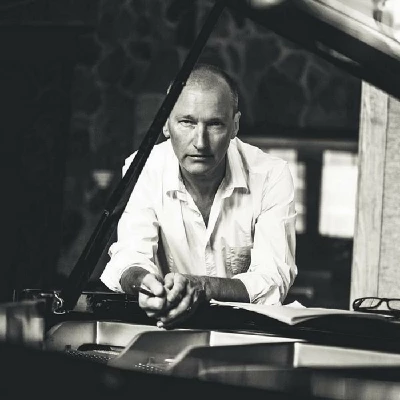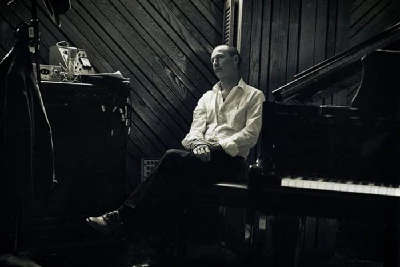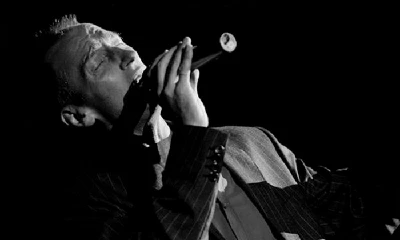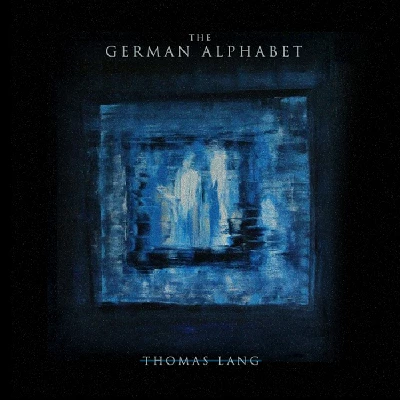published: 8 /
2 /
2017

Liverpool-based singer-songwriter Thomas Lang to John Clarkson about 'The German Alphabet', his first album in twenty years which combines electronica with jazz and John Barry/Ennio Morricone influences
Article
Liverpool-based singer-songwriter and musician Thomas Lang has recently returned with ‘The German Alphabet’, his first studio album in twenty years.
‘The German Alphabet’ takes the combined influences of big band sounds of the 1940s, torch songs of the 1950s and the soundtracks of John Barry and Ennio Morricone of the 1960s and then merges them with electronica. It was recorded with the production team of Colin McKay and Alan Currie and has been released on Klee Music.
Thomas Lang met with critical acclaim for his jazz-influenced debut album, ‘Scallywag Jazz’, which came out in 1987 on CBS. He had a chart hit with the single ‘Happy Man’, toured with Suzanne Vega and Alison Moyet, and supported Nina Simone at the Royal Festival Hall in London Lang, who is also co-owner and Director of Parr Street Recording Studios and Director of the Liverpool Philharmonic Hall, recorded three other studio albums, ‘Little Moscow’ (1990), ‘The Lost Letter Z’ (1991) and ‘Versions’ (1996) , before taking an extended hiatus from music, only finally returning in 2014 with ‘Torch’, a live album.
Pennyblackmusic spoke to Thomas Lang about ‘The German Alphabet’ and his return to music.
PB: ‘The German Alphabet’ takes the sounds of different eras and then updates them for modern times. Was that your prime intention?
TL: This project began when I was approached by Steve Kinrade, who owns Klee Music and who invited me to work on an album that he had been working on with Alan Currie and Colin McKay. Their original plan was for me to just guest on a couple of the tracks. It wasn’t going to be my album. They had some ideas and sketches for songs already, the first three of them being ‘Watchman’, ‘Pulse’ and ‘Rain’. Somebody described it as “an electronic trilogy”, and so we worked on those songs together. If you take those songs separately from the album, you can hear where it started from.
I went in and did the three vocals in my studio. We all felt that it was going somewhere, and so the idea was scrapped that it would be an album for Alan and Colin. We became a team. we are all big fans of Ennio Morricone and John Barry and the whole James Bond thing, but we all put different colours and ideas into the pot. Some of them came from Colin, some of them from Alan, and some of them from me, especially the jazz element. We all went into the whole project together.
Our idea was that each song could be the soundtrack to a movie that has never been made and it would have a start, a middle and an end in its storytelling. We had a lot of conversations about things that had happened in our lives. ‘Colorado Boulevard’, for example, is about Colin. He was living in Pasadena, and staying with his ex-wife and trying to work out where he was going with his life. He used to go and watch the Premier League because of the time difference at 7.30 p.m. on Saturday evenings in this café which had satellite TV, and if you listen to the song you can really hear that whole story in there. Each song is based on those storytelling ideals. ‘Be Missing’, for example, is based on the film ‘Casino’ about the mafia.
PB: What were Alan Currie’s and Colin McKay’s backgrounds?
TL: I had worked with Colin McKay many years ago when he was in a band called Here’s Johnny, and he had gone on to do a lot of in-house production for Deltasonic, the label which the Coral were on. He is a very well known producer and musician in Liverpool. Alan’s first instrument is drums. He has been in quite a few bands around Liverpool and we have all crossed paths throughout the years. We all came to the project first and forward from being musicians, Colin’s first instrument being guitar, Alan’s being drums and mine being voice.
PB: Where did the electronic element fit into this? A lot of the music on ‘The German Alphabet’ has a big band sound but it is largely electronic.
TL: Basically it was a case of where needs must. We used programming to sketch out some of the ideas for songs, and that is where we started with ‘Pulse’, ‘Rain and ‘Watchman’. We had already collated those in the soundscape electronically, and while we did bring in more of a jazz element on the other tracks we carried on in that vein. We couldn’t afford to bring in a load of musicians into a big studio and pay those expenses.
PB: Did you largely record it in Parr Street Recording Studios?
TL: It was partially recorded in Vale Studios, Alan Currie’s home studio and partially in Parr. We did pretty much all of the vocals in Parr Street.
PB: It took a year to record. Did you just record it piece meal and when you could basically?
TL: Yeah. For me it was a very strange time because I had stopped doing what I was doing to look after my mum. My mum was ill. She was 91. It was a life saver really because I had become her primary carer at that point, and, while I wanted to look after her, doing this album was at the same time was a way for me of getting away from reality.
My mum would come and live with me sometimes. She was very independent like a lot of Viking ladies are. She was half Swedish. She wouldn’t give up her independence and I didn’t want her to, but it meant that I did a lot of driving and getting the shopping done and making the lunch and tea and sure that she was in bed and safe every night. I was lucky though because she was independent right up until she had a massive stroke earlier this year and passed away a few days later. In the year before she died doing this album was my total respite. I think you can hear a joyous thing in some of it because it was getting away from reality and the fact that my mum was deteriorating.
PB: ‘The German Alphabet’ is your first album studio album in twenty years. You were very prolific in the 1980s and 1990s and did four studio albums in ten years. Why has there been this long gap?
TL: Truthfully I got sidetracked. I bought into Parr Street with two friends of mine and was sidetracked by business, and before you know it ten, twenty years have gone by and you haven’t released an album.
So, part of me was being grown up and being realistic about how I paid my mortgage and getting the business thing off the ground and realising that there were other things that I could do rather than just write and sing songs. It was difficult earning a living it at that point and I really needed to have another income. I think I had also fallen out of love with music for a little while, and was feeling a little disappointed by the music industry. If you have a relationship that doesn’t work out, it takes a lot of courage to get back into another one.
It took me a long time to sing again, but I think the hiatus did something for me and my singing. Before I signed to CBS the easiest thing in the world for me was to sing. Suddenly I found that I was putting myself under the microscope for everything that I did and becoming very self-conscious, but when we did this album everything was done in three takes and most of them were straight vocals with no drop-ins. I went into the studio and the maximum time that I would be in the studio to do the vocal would be an hour and a half. I felt I had a performance in that and those three takes and that was what I do best, live performance.
PB: Of the songs that you wrote for the album, how many of them were old songs and how many of them were written more recently?
TL: the majority of them were written recently. On the vinyl version there is a song on there called ‘Lost Till I Found You’, and when I first began writing this album I went over to see my old writing partner Dave Hughes. He co-wrote most of my old stuff with me, and he is now works on films. He did the soundtrack for ‘Lock, Stock and Two Smoking Barrels’, and then went on to do ‘Miami Vice’ and ‘28 Days Later’ and most of the Danny Boyle films apart from ‘Slumdog Millionaire’.
We worked on ‘Lost Till I Found You’ in the late 1980s, and had demoed it for a film but it wasn’t used. I was chatting to Dave and he said, “I have found the last thing that we did,” and he played ‘Lost Till I Found You’, and I went, “How come that was never used maybe for another film? It is a great piece of music,” and he said, “It is just director’s choice, I suppose.” It was too good for it to be left on the shelf and for no one to hear, so I decided to put it on this album. I spoke to Alan and Colin and they loved it and we talked about re-recording it and I said, “No.” They said, “Do you want to put a vocal that you did twenty years ago next to a vocal that you are doing now?” and I said, “Yeah, I think it is honest to do that, and if my voice doesn’t stand up now to what I did over twenty years ago then so be it.” I think though with this new way of recording songs and doing each song as a performance I think my voice stands up to that scrutiny where you put ‘Lost Till I Found You’ next to, say, ‘Rain’ or ‘Pale Imitation’. My voice has had a good rest (Laughs).
PB: The title track is about the desperate lengths we will all go to find love. What was the inspiration for that one? Was that one of yours?
TL: It was a combination of the three of us, but I would say that the lead for that one was Colin McKay and Alan’s. It is basically about how you would go to any length to get this person that you want, but the truth of the matter is that there are only four more letters in the German alphabet and, while you would say you would do anything to be with that person, no, you wouldn’t really (Laughs) It is about the bullshit of promises really.
PB: ‘Film Stars’ takes is inspiration from the Peter Turner book ‘Film Stars Don’t Die in Liverpool’, which tells of his relationship with the dying Hollywood actress Gloria Grahame. What was the appeal to you of that story?
TL: Twenty-five years ago Peter Turner was having a love affair with one of my best friends. I was about to go off to New York to work on some tracks with the producer Harvey Jay Goldberg who had just done Danny Wilson. We were all at the same dinner party and he said, “I have just written this book. I love what you do. I would love you to try and write a song for my film.” There was a film in pre-production at that stage. I said that I would take it with me, and I read the book on the plane to New York and felt inspired enough to write that song, That song is the only other demo on the album. I sat at my piano and wrote that song for the film, but that version of it never got made. Now funnily enough Barbara Broccoli of James Bond/John Barry fame has bought the rights, and it is being made into a film which is practically finished as we speak and will be out next year. We have managed to get a track to Barbara Broccoli. We are waiting to hear if we have got any chance of getting it onto the film.
PB: Do you have a favourite track on the album?
TL: It changes very time I listen to it (Laughs). I am still too close to it, but at the moment I would say ‘Pale Imitation’. I give on that a really great performance. That was one take. That was one of those occasions in which we had it in the bag and we thought, “Let’s not bother doing another.” We were in and out of the studio in twenty-five minutes (Laughs), and so there is the memory of that behind that.
I love ‘Colorado Boulevard’. I love the storytelling aspect of ‘Colorado Boulevard’.
It is to me is like ‘Broken Bicycles’ by Tom Waits on ‘One from the Heart’. It is a track that I love but it never really gets the light of day because because it is so embedded into the album. ‘Broken Bicycles’ is a lament for things that should have happened and ‘Colarado Boulevard’ has that as well.
I absolutely love ‘Film Stars Don’t Die ’ as well as it is so stark and just me at the piano. At one point if you listen closely to it you can hear me turning the manuscript paper on the lyrics and having a drag on a cigarette (Laughs).
PB: You have had such a multi-parted career. You’re a studio and a venue director and you’re also a singer. Do you see yourself as firmly one thing more than the other?
TL: First and foremost I see myself as a singer, performer and writer, a singer before anything else though really. I did the live album ‘Torch’ a few years ago. I listen a lot to Billie Holiday, Etta James, Bessie Smith, early Sinatra, and I got to thinking about those people that when they did an album if that album is forty minutes long it took them forty minutes to record the damned thing, So, I decided to go and do a live show and record it and release it live and that is what I did. I did it with a full jazz band, upright bass, grand piano, saxophone, live soprano.
Just before I did that someone asked me, “What I did for a living?” and I said, “I am a singer,” and they said, “Really. I have not heard you perform. When did you last perform?” I asked myself that question and I thought, “Can I call myself that anymore?” and that is when I decided to get back into the saddle really.
PB: Final question. What are your plans for the future?
TL: It has been a really crap year. My partner lost his father. I lost my mum and, now that the album has come out, I am off to Sri Lanka for eight weeks as I don’t want to be home for my first Christmas without my mum. I have hopefully secured new management and we are working on finding an agent.
I really want to go back out and perform live and so I am hoping to announce some dates in late February . I don’t want ‘The German Alphabet’ to just float into the ether, so I think the only way I can take this album forward is to get the album out to as many people as I can live and the plan is to do as much live work as I can in 2017.
PB: Thank you.
Band Links:-
https://www.facebook.com/thomaslang.uk
https://thomaslang.uk/
https://twitter.com/thomaslanguk/
https://www.instagram.com/thomaslanguk
https://www.youtube.com/user/ThomasLan
Play in YouTube:-
Picture Gallery:-


